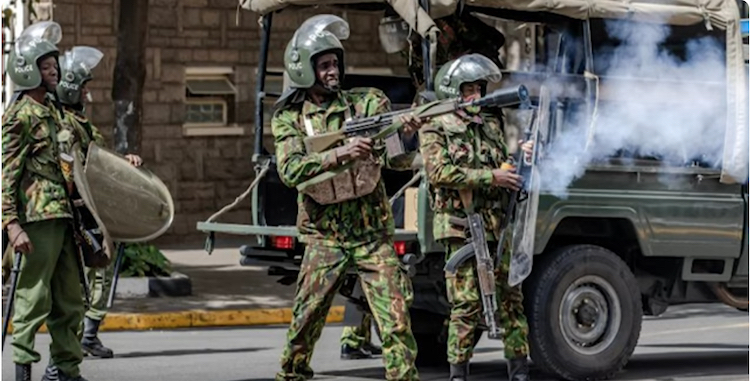By Thalif Deen
UNITED NATIONS 7 October 2023 (IDN) — A Multinational Security Support (MSS) mission led by Kenya –assigned to the politically troubled Caribbean nation of Haiti—has come under fire even before it could get off the ground.
Amnesty International (AI) Kenya says there is a need to thoroughly assess Kenyan security forces’ human rights track record before endorsing their deployment to Haiti.
Recent reports have condemned the unlawful use of force against protestors by Kenyan police, including instances of excessive and lethal force resulting in deaths and injuries.
These incidents raise concerns about the suitability of Kenyan law enforcement officers for this role, Amnesty said.
According to a report in the New York Times on October 6, the proposed mission will be led by Kenyan police officers who have been accused of “killing more than 100 people this year and lobbing tear gas into a school during anti-government demonstrations”.
The Times also quotes a Kenyan, whose family was attacked by the police, as saying: ”If you want to protect someone, you have to (first) protect your own people.”
“Let them (the Kenyan police) put their house in order first before going to put someone else’s house in order.”
Kenya’s Foreign Minister Alfred Mutua was quoted as saying the MSS would require about 10,000 to 20,000 personnel—with over 50 countries, including Spain, Senegal, Jamaica, Bahamas and Antigua-Barbuda, “ready” to assist.
At a US State Department briefing on October 2, Secretary of State Antony Blinken said: “We intend to work with Congress to provide $100 million in foreign assistance, and the Department of Defense is prepared to provide up to $100 million in enabling support. We continue to look to the international community to also provide funding, equipment, training, and personnel to support a truly multinational effort.”
While this action represents important progress, the United States renews its urgent call to political actors, including Prime Minister Henry and members of the opposition, to broaden consensus and restore democratic order in Haiti, he declared.
The mission to Haiti, a response from Haiti for international support to address the widespread gang violence, was co-sponsored by the US and Ecuador and approved by the 15-member UN Security Council, with two abstentions: China and Russia.
The resolution authorizes the MSS mission to provide operational, static, and training support to the Haitian National Police.
In a statement released on October 3, Amnesty International Kenya notes the UN Security Council decision to deploy an international security force to Haiti led by 1,000 Kenyan law enforcement officers.
The resolution includes clear, mandatory, and enforceable human rights-based parameters for the UN Mission. “It is critical that UN Member States, human rights organizations and citizens thoroughly examine the mission’s human rights and humanitarian implications before deployment,” AI said.
Haiti has a deeply troubling history of abuses and impunity associated with past multinational or foreign interventions.
These interventions have lacked accountability mechanisms for excessive use of force and witnessed a wide range of abuses, including sexual exploitation. Acknowledging that these interventions occurred in the shadow of a cholera epidemic triggered by UN personnel is imperative, AI said.
“Clear, mandatory, and enforceable parameters must detail the operational and oversight measures preventing the unlawful use of force, negligence causing harm to local populations and other abuses before deployment.
This must include robust measures to protect individuals against sexual exploitation and abuse, ensuring accessible and effective remedies for victims. The Mission must adhere to UN human rights due diligence policies to assess and address potential human rights impacts”, warned Irungu Houghton, Executive Director of Amnesty International Kenya.
At a national level, the deployment of 1,000 Kenyan Police Officers requires the express approval of the Inspector General and parliamentary oversight under the Kenya Constitution. Parliament is urged to now table and discuss the proposal for this foreign mission that involves Kenyan lives.
Amnesty International Kenya also calls for meaningful consultations with Haitian civil society and mass media before the deployment of stabilization support. “We emphasize the importance of supporting Haitian-led solutions for long-term stability and actively addressing the root causes of violence in the country.”
Human rights, accountability, safety and dignity of the Haitian people must remain at the forefront of this policing mission, AI said.
Meanwhile, following the Security Council decision, Secretary-General António Guterres welcomed the adoption of the Resolution approving the deployment of “a non-UN Multinational Security Support mission.”
In a statement issued after the vote, the head of the political mission in the country, Maria Isabel Salvador, said “this is a positive and decisive step to bring peace and stability to Haiti.”
The decision, she added, comes after a request by the Haitian Government – and echoed by the Secretary-General—realizing that the country will not emerge from the current security situation without strong international support for the Haitian National Police.
The UN Integrated Office in Haiti (BINUH) will fully support the Multinational Security Support mission, within the limits of its mandate, the Human Rights Due Diligence Policy and in full respect of the decisions taken by the Haitian State.
“While awaiting the deployment of this mission, the UN will continue to engage closely with Haitian authorities—in particular in support to the police, the corrections and justice system, and the electoral process,” she declared. [IDN-InDepthNews]
Image: YouTube screenshot from African Insider.
IDN is the flagship agency of the Non-profit International Press Syndicate.


